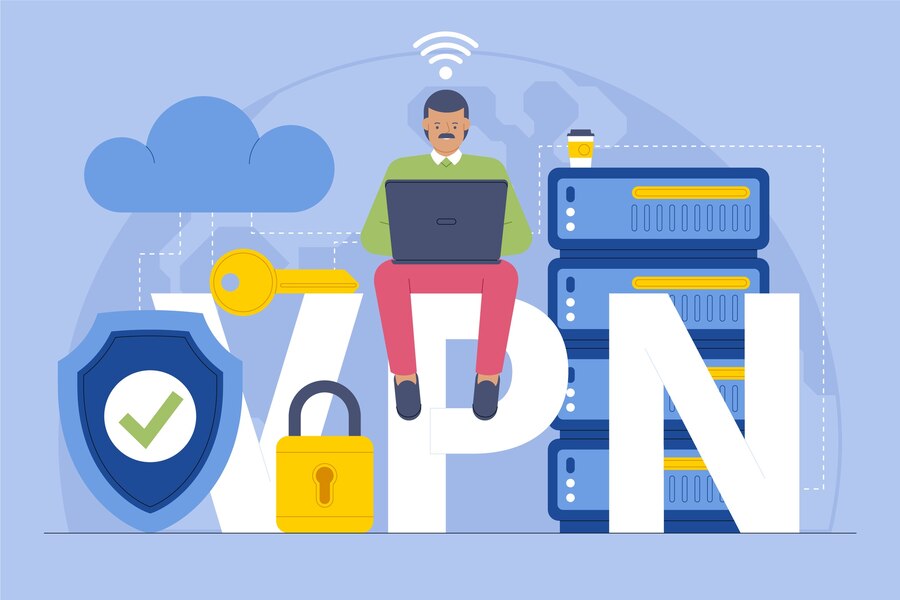
VPS Solutions for Data Protection and Efficient Project Management , Virtual Private Servers (VPS) are an innovative and ideal hosting solution for individuals and businesses looking for a powerful, secure environment to manage and operate their projects. VPS represents a balance between shared hosting, which may lack performance and customization, and dedicated hosting, which can be unnecessarily expensive for certain businesses.
One of the most significant advantages of VPS is the ability to customize server settings and allocate resources as needed, coupled with robust security features. In this article, we will discuss how VPS solutions help protect data and ensure efficient project management by offering high performance, reliability, and flexibility, making them a perfect choice for businesses of all sizes.
What is VPS Solutions?
A VPS or Virtual Private Server is a server that has been divided into multiple virtual environments using virtualization technology. Each VPS runs its own operating system (OS) and has dedicated resources like CPU, RAM, and storage. Even though several VPSs share the same physical server, each VPS is isolated from the others, ensuring privacy and security.
VPS hosting allows users to have full control over their virtual environment, enabling them to install software, manage security protocols, and configure the system according to their needs—without the constraints typically found in shared hosting.
1. Data Protection: A Core Feature of VPS
Data protection is one of the primary reasons businesses choose VPS hosting. In a world filled with cyber threats like malware, phishing attacks, and DDoS attacks, securing sensitive data is critical. VPS solutions come with a suite of tools and technologies designed to enhance security and ensure that your data remains safe and private.
1.1 Complete Isolation Between Servers
One of the core benefits of VPS is the complete isolation it provides between users. Although several VPSs may reside on the same physical server, each VPS operates independently from others. This isolation ensures that your data is protected from unauthorized access, unlike shared hosting environments where other users may potentially gain access to your data.
1.2 Data Encryption
Data encryption is an essential security feature in VPS hosting. Whether encrypting data during transmission using protocols like SSL/TLS or encrypting data at rest, VPS offers robust encryption methods to keep data secure. These encryption technologies ensure that any data sent between the server and users is unreadable to malicious actors.
1.3 Firewalls
Most VPS solutions come with dedicated firewalls to protect the server from unauthorized access. These firewalls can be configured to filter incoming and outgoing traffic based on IP address, protocol, or other criteria. By using firewalls, businesses can reduce the risk of data breaches and prevent cybercriminals from infiltrating their systems.
1.4 Automatic Security Updates
To protect against vulnerabilities, many VPS providers offer automatic security updates. These updates patch any security flaws in the operating system and software applications, ensuring that the server remains protected against the latest threats.
1.5 Full Access Control
VPS hosting allows users to set access permissions for various users or team members. This means that only authorized individuals can access certain files or make critical system changes. You can easily control who can read, modify, or manage sensitive data, ensuring that your project is secure.
2. High Performance and Efficiency
While shared hosting may be sufficient for smaller websites, it often falls short when it comes to handling more complex applications or higher traffic loads. VPS provides better performance, making it ideal for businesses that need high levels of reliability, speed, and efficiency.
2.1 Resource Allocation
One of the most significant advantages of VPS is the dedicated resources it offers. Unlike shared hosting, where resources such as RAM, CPU, and storage are shared between multiple users, VPS provides each user with a specific allocation of resources. This ensures that your project or application will perform optimally, even under heavy load.
2.2 Speed and Responsiveness
VPS ensures faster speeds and better responsiveness compared to shared hosting. Since the server resources are allocated specifically to your VPS, you are less likely to experience slowdowns caused by other users on the same server. Your website or application can operate more efficiently, leading to a better user experience.
2.3 Scalability
Another benefit of VPS is its scalability. As your business grows and your project demands more resources, you can easily upgrade your VPS plan to accommodate increased traffic or storage requirements. VPS hosting allows you to scale your resources in a flexible, cost-effective way without the need for a complete infrastructure overhaul.
3. Full Control Over the Environment
With VPS, users enjoy full control over their server environment. This allows them to tailor the configuration and settings to meet their specific project requirements.
3.1 Customizable Operating Systems
VPS users can choose the operating system (OS) that best suits their needs. Whether it’s Linux, Windows, or other specialized OS, users have the flexibility to install the operating system they are most comfortable with or one that supports the necessary applications for their project.
3.2 System Updates and Maintenance
With VPS, you have the ability to handle your server maintenance and updates independently. You can schedule updates, apply patches, and even restart your server as needed. This control ensures that your system remains up-to-date and secure without relying on third parties.
4. Cost-Effective Solution
While dedicated hosting can be quite expensive, VPS hosting offers a more affordable alternative with many of the same benefits. VPS providers typically offer flexible pricing plans, allowing you to scale your resources as needed. This makes VPS an excellent option for small and medium-sized businesses that need a cost-effective way to host their websites or applications with a high level of performance and security.
5. VPS Applications in Business
VPS hosting is used across various industries and applications due to its versatility and robustness. Some of the most common uses include:
- Web Hosting: VPS is widely used for hosting websites, especially those with higher traffic or specific performance needs.
- Application Hosting: VPS is ideal for hosting web applications and services, especially for businesses that require tailored setups.
- Data Backup: Many businesses use VPS for secure data backup and storage, ensuring that important files are protected and accessible.
- Database Management: VPS provides an ideal environment for managing databases like MySQL, PostgreSQL, and others, with full control over database performance.
- Cybersecurity: VPS can be used to run security tools and services that protect websites, applications, and servers from online threats.
VPS Solutions
VPS solutions are an excellent choice for businesses looking to protect their data and run their projects efficiently. With the ability to customize resources, ensure high performance, and implement strong security measures, VPS hosting offers a balanced and cost-effective solution for businesses of all sizes.
If you’re looking for secure hosting with high performance for your project, VPS solutions are a smart and reliable choice.

Leave a Reply